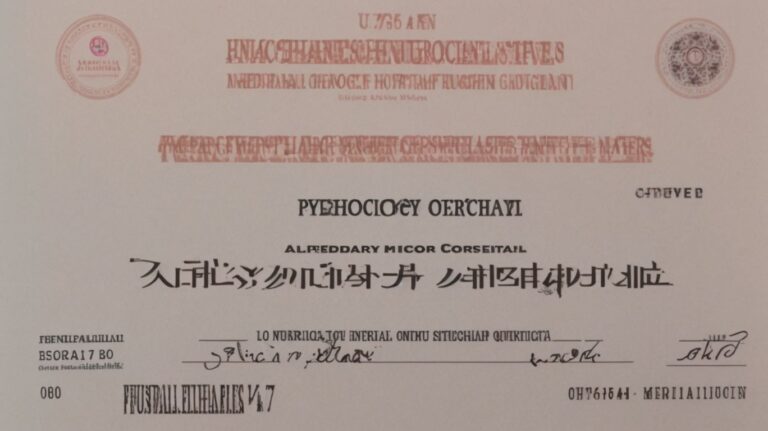Have you ever wondered how long it takes to form a habit? The 21-day myth, the 66-day rule, and the 254-day reality all play a role in habit formation.
Personal motivation, environmental cues, social support, and emotional triggers are key factors that influence the process. Understanding the stages of habit formation – cue, routine, and reward – can help you harness the power of habits for personal development.
By setting SMART goals, creating a plan of action, tracking progress, and celebrating successes, you can make lasting changes in your life. Let’s explore the psychology of habit formation together.
Contents
- 1 Key Takeaways:
- 2 What Is Habit Formation?
- 3 How Long Does It Take to Form a Habit?
- 4 What Factors Influence Habit Formation?
- 5 What Are the Stages of Habit Formation?
- 6 How Can Habit Formation Be Used for Personal Development?
- 7 Frequently Asked Questions
- 7.1 What is the definition of habit formation?
- 7.2 How long does it take to form a habit?
- 7.3 What are the key factors that influence habit formation?
- 7.4 Why is it important to understand the psychology of habit formation?
- 7.5 Can habits be broken?
- 7.6 How can one use the knowledge of habit formation to improve their daily life?
Key Takeaways:
What Is Habit Formation?
Habit formation refers to the process by which behaviors become automatic through repetition and reinforcement, as studied in psychology and neuroscience.
Pioneers like William James and B.F. Skinner have delved into the mechanisms underlying habit formation.
William James, a renowned philosopher and psychologist, introduced the concept of habit into psychological discourse, emphasizing its role in shaping human behavior. He highlighted how habits, once formed, guide our actions almost effortlessly, making them powerful drivers of our daily routines.
B.F. Skinner, an influential behaviorist, further elucidated the principles of habit formation through his research on operant conditioning. He demonstrated how behaviors could be reinforced or extinguished based on their consequences, laying the groundwork for understanding how habits are shaped and maintained.
How Long Does It Take to Form a Habit?
The duration required to form a habit varies depending on individual factors and the complexity of the behavior. Neuroscience highlights the role of the basal ganglia in habit formation, emphasizing the importance of persistence in establishing lasting habits.
Regarding habit formation, the process typically follows a timeline that can range from a few weeks to several months, as suggested by research in neuroscience.
The basal ganglia, a key region in the brain responsible for motor control and reinforcement learning, plays a crucial role in the development of habits.
Persistence is essential as it allows the brain to rewire itself, strengthening the neural pathways associated with the desired behavior.
Individual differences in habit formation can be attributed to various factors such as genetics, environment, and past experiences, all of which influence how quickly a habit is formed and how deeply it is ingrained.
The 21-Day Myth
The notion that habits can be formed in 21 days, often attributed to William James, has been popularized as a myth. While establishing routines and making progress are essential components of habit formation, the timeline may vary significantly.
Research suggests that the time required to form a habit is more complex than a fixed 21-day period. Factors such as individual behavior, motivation, and the complexity of the habit being developed play crucial roles.
- Psychology studies indicate that on average, it takes around 66 days for a behavior to become automatic.
- Consistent repetition and gradual improvement are key for ingraining habits into one’s daily life.
Understanding one’s own patterns and triggers can help tailor habit-building strategies for long-term success.
The 66-Day Rule
Research by Wendy Wood suggests that habit formation typically takes around 66 days, highlighting the role of persistence and strategic decision-making in cultivating lasting habits.
Wood’s findings shed light on the significance of perseverance in the journey of habit creation. Her research underscores the notion that habits are not just mere actions but are deeply ingrained behavioral patterns that require time to solidify within one’s routine.
Wood’s emphasis on strategic decision-making in forming habits taps into the idea that small consistent actions over an extended period are more impactful than sporadic bursts of effort.
Neuroscience corroborates the 66-day rule, revealing that repeated behaviors gradually alter the neural pathways, making the habit more automatic and effortless over time. This connection between behavior and brain rewiring provides a scientific foundation for understanding the organic evolution of habits.
The 254-Day Reality
In reality, habit formation can extend far beyond the 66-day mark, with some complex behaviors requiring up to 254 days to become ingrained. Motivation, discipline, and tracking progress play crucial roles in achieving automaticity in habits.
During the extended timeline of 254 days, individuals undergo a journey of consistent effort and dedication towards transforming a behavior into a reflexive action.
This prolonged period reflects the intricate process of rewiring the brain patterns and integrating new actions into daily routines.
Motivation acts as the driving force behind the initial push towards change, fueling the determination needed to persevere through challenges.
Discipline becomes the pillar that upholds consistency, guiding individuals through moments of wavering resolve and temptation.
Monitoring progress serves as a compass, offering valuable insights into the effectiveness of chosen strategies and enabling necessary adjustments to optimize habit formation.
What Factors Influence Habit Formation?
Several factors influence habit formation, including personal motivation, environmental cues, social support, and emotional triggers. Psychologist Edward Tolman’s work sheds light on the role of cognitive processes in habit development.
Personal motivation plays a vital role in initiating and maintaining habits. When individuals are intrinsically motivated to adopt a particular behavior, they are more likely to stick with it over time.
Environmental cues, such as visual reminders or specific triggers, can also greatly impact habit formation. Social support, whether from friends, family, or online communities, can provide encouragement and accountability, making it easier to establish new habits.
Understanding how emotional triggers affect habit formation is crucial for individuals looking to make lasting behavioral changes.
Personal Motivation
Personal motivation serves as a fundamental driver in habit formation, fueling the discipline needed to set goals, manage time effectively, and track progress towards behavior change.
When individuals are motivated intrinsically by their own desires and values, rather than external pressures, they are more likely to stay committed to their habits.
Motivation provides the fuel to overcome obstacles and setbacks, enabling individuals to push through challenges and maintain consistency.
By linking personal aspirations to daily actions, people can create a meaningful connection between their habits and their overall life goals.
This connection enhances the sense of purpose and fulfillment, making the habit formation process more rewarding and sustainable.
Environmental Cues
Environmental cues play a significant role in habit formation, as they help establish routines and create neural pathways that reinforce behaviors. Understanding and leveraging these cues can aid in sustaining positive habits.
When individuals design their environment to support desired behaviors, it becomes easier to stay on track.
For instance, placing a water bottle on the desk as a visual cue can prompt regular hydration. Likewise, setting out workout clothes the night before can serve as a cue to exercise in the morning.
By strategically using these cues, such as post-it notes with motivational messages or organizing the kitchen for healthier eating, individuals can align their surroundings with their goals, making habit formation more effortless.
Social Support
Social support plays a crucial role in habit formation, providing encouragement, accountability, and reinforcement for individuals striving to adopt new behaviors. Wendy Wood’s research highlights the impact of social context on habit development.
When an individual receives a dose of positive reinforcement from their social circle, whether it be family, friends, or colleagues, it can greatly influence their commitment to sticking to their desired habits.
This support system acts as a pillar of strength, pushing them to stay consistent even when faced with challenges or temptations. Accountability, another vital component of social support, holds individuals responsible for their actions by creating a sense of obligation to meet their set goals. Knowing that someone is rooting for them and monitoring their progress can significantly increase their motivation and dedication.
Emotional Triggers
Emotional triggers can either facilitate or hinder habit formation, with stress and mindfulness playing significant roles in managing these triggers. Addressing mental health concerns and emotional states is essential for cultivating sustainable habits.
Emotions like stress can lead individuals to engage in habits that provide temporary relief but may not be beneficial in the long run.
Mindfulness, on the other hand, can help individuals become more aware of their emotions and make conscious choices about their actions. By being mindful of how certain triggers impact behavior, individuals can develop strategies to navigate these challenges and form healthier habits.
Improving mental health can create a strong foundation for changing existing habits and developing new ones that support overall well-being.
What Are the Stages of Habit Formation?
Habit formation progresses through distinct stages, beginning with the cue stage where triggers prompt behaviors, followed by the routine stage involving the behavior itself, and culminating in the reward stage that reinforces the habit.
Cognitive learning processes underpin these stages.
During the cue stage, individuals are often unaware of the triggers that prompt their behavior. These cues can be subtle or deeply ingrained in their environment.
The routine stage represents the actual behavior that occurs in response to the cue. It is influenced by past experiences, beliefs, and environmental factors.
The reward stage provides a sense of gratification or pleasure that reinforces the habit loop. This makes the behavior more likely to be repeated in the future.
The Cue Stage
The cue stage of habit formation involves identifying triggers that prompt specific behaviors, setting the initial pathway for habit development. Understanding and managing cues are crucial for fostering behavior change and tracking progress.
Identifying triggers in the cue stage is like deciphering the keys to behavioral patterns, unlocking the door to sustainable change.
By recognizing the cues that initiate actions, individuals gain valuable insights into their thought processes and habitual responses.
Cognition plays a vital role at this stage, as the conscious awareness of triggers enables individuals to make informed decisions and reshape their routines effectively.
Progress monitoring within the cue stage acts as a compass, guiding individuals towards their desired behavioral outcomes and reinforcing positive habits.
The Routine Stage
The routine stage of habit formation involves the consistent performance of a behavior, leading to increased automaticity over time. The basal ganglia plays a key role in solidifying routines and transforming behaviors into habits.
When we repeatedly engage in a specific activity or behavior, the basal ganglia, a cluster of structures in the brain, begins to encode this routine by creating neural pathways.
These pathways become more efficient with each repetition, making the behavior more automatic and requiring less conscious effort.
The basal ganglia is crucial in habit formation as it helps reinforce the connections between cues, actions, and rewards, leading to the establishment of enduring habits.
The Reward Stage
The reward stage of habit formation reinforces behaviors through positive outcomes, fueling motivation and encouraging further progress. Celebrating achievements at this stage can boost adherence to new habits and foster a sense of accomplishment.
By incorporating rewards strategically, one can create a system that not only promotes consistency but also cultivates a positive mindset towards the habit building process.
Rewards serve as a powerful tool to reinforce desired behaviors, making it more likely for individuals to stick to their routines. When milestones are met, taking the time to acknowledge and celebrate these victories can strengthen the neural pathways associated with the habit, solidifying its place in daily life.
How Can Habit Formation Be Used for Personal Development?
Harnessing habit formation for personal development involves setting SMART goals, creating actionable plans, tracking progress, and celebrating successes along the journey.
By integrating Robert Kanaat’s strategies into your self-improvement efforts, you gain a structured approach to use habits effectively.
Setting SMART goals ensures that your objectives are Specific, Measurable, Achievable, Relevant, and Time-bound, providing clarity and motivation for your growth journey.
Action planning transforms aspirations into concrete steps, breaking down tasks into manageable activities.
Continuously monitoring progress allows you to adjust strategies and stay on course towards your desired outcomes.
Acknowledging and celebrating small victories reinforce positive behaviors, fostering a sense of achievement and motivation.
Setting SMART Goals
Setting Specific, Measurable, Achievable, Relevant, and Time-bound (SMART) goals is a foundational step in leveraging habit formation for personal development. SMART goals provide clarity, focus, and direction in behavior change efforts.
When you set specific goals, you define exactly what you want to achieve, leaving no room for ambiguity. Measurable goals allow you to track your progress and determine when you have successfully reached your desired outcome.
By ensuring goals are achievable, you set yourself up for success instead of feeling overwhelmed by unrealistic expectations. The relevance aspect ensures that your goals align with your values and long-term objectives, giving them a deeper sense of purpose.
The time-bound nature of SMART goals adds a sense of urgency, motivating you to take consistent action towards your aspirations. These attributes of SMART goals not only guide your actions but also provide a roadmap for your personal growth journey, propelling you towards greater achievements and success.
Creating a Plan of Action
Developing a structured plan of action is essential for translating goals into tangible habits. This plan outlines the steps, resources, and timelines needed to maintain motivation, track progress, and achieve desired outcomes.
When embarking on the journey of habit formation, having a clear roadmap can significantly increase the likelihood of success. By breaking down the overarching goal into smaller actionable steps, individuals can navigate the complexities of habit formation with greater ease.
A well-crafted plan not only provides direction but also serves as a source of motivation. Regularly monitoring progress against the set milestones can fuel the drive to continue, especially when faced with challenges along the way. Aligning these actions with the ultimate goal ensures that each step taken contributes directly to the bigger picture.
This alignment reinforces the purpose behind the habits being formed and instills a sense of purpose and fulfillment. Without a structured plan, individuals may find themselves aimlessly going through the motions, making it harder to stay consistent and dedicated to their habit-building efforts.
Tracking Progress and Making Adjustments
Regularly monitoring progress and making necessary adjustments are key practices in habit formation, enabling individuals to adapt strategies, address challenges, and optimize routines for success.
Utilizing neuroscience insights can provide valuable guidance to enhance progress tracking techniques for sustained habit development. Understanding how the brain processes and reinforces habits can help individuals tailor their monitoring methods.
By incorporating techniques like journaling progress, utilizing habit tracking apps, or even engaging in mindfulness practices, individuals can fine-tune their habits effectively. This constant cycle of tracking, analyzing, and adapting not only strengthens habits but also fosters a deeper awareness of personal behavioral patterns.
Celebrating Successes
Celebrating successes along the habit formation journey boosts motivation, reinforces positive behaviors, and cultivates a healthy lifestyle. Acknowledging achievements helps individuals stay engaged and committed to their personal development efforts.
This positive reinforcement not only provides individuals with a sense of accomplishment but also serves as a powerful tool in sustaining progress.
When individuals mark their milestones with celebration, they create a cycle of positivity that fuels further dedication. As these habits become ingrained in daily routines, the impact transcends into other aspects of life, leading to overall lifestyle changes.
Consistent recognition of achievements encourages individuals to strive for even greater goals, pushing them to surpass their previous limitations and reach new heights.
Frequently Asked Questions
What is the definition of habit formation?
Habit formation is the process of creating a new behavior or routine through repeated actions. It involves the formation of neural pathways in the brain that make the behavior automatic and unconscious.
How long does it take to form a habit?
The timeline for habit formation varies depending on the individual and the behavior being formed. On average, it can take anywhere from 21 to 66 days for a habit to become automatic.
What are the key factors that influence habit formation?
There are several factors that can influence habit formation, including environmental cues, motivation, repetition, and emotions. These factors can either facilitate or hinder the formation of a habit.
Why is it important to understand the psychology of habit formation?
Understanding the psychology of habit formation can help individuals break bad habits and form healthier ones. It can also assist in creating more efficient and productive routines.
Can habits be broken?
Yes, habits can be broken with conscious effort and repetition. However, it may take longer to break a habit than it does to form one.
How can one use the knowledge of habit formation to improve their daily life?
By understanding the timelines and influencing factors of habit formation, individuals can use techniques such as setting specific goals, creating a supportive environment, and tracking progress to form healthy habits in their daily life.




